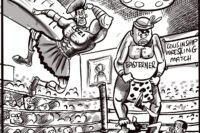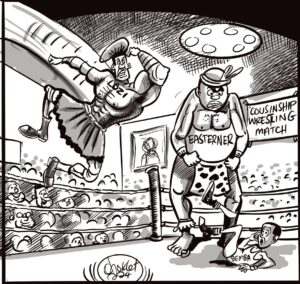ZAMBIA Aquaculture Cooperative Society chairperson Collins Kachaka says Zambia’s economy can grow within a short period if government becomes serious about growing the fish farming industry.
In an interview, Kachaka said the country’s economy would significantly improve if government was committed to promoting fish farming.
“It (fish farming) has a great potential to grow the economy of the country that is for sure. But the challenges we have really, we can do much better. If you look at how much water we have for example in Luapula Province and Western Province, there is no fish at all, nothing. If the government did a good job to ensure that we transform Luapula Province into a fish hub of Zambia, I can assure you the economy of this country can grow in a short time. Fish is harvested in six months only and in one year I think our Kwacha would start to be strong,” he said.
“In fact, even in the near future, I can assure you that if our government becomes serious about growing this industry, it can beat agriculture by far. And Zambia has about 60 percent of the water here in Africa meaning that God even designed Zambia to be a fish farming area. So it’s not about saying in four or five years, no! Look, we have so many rivers, and these rivers and streams, there is no fish at the moment because we have overfished. If along every river we dug fish ponds, I can assure you that in a period of a maximum of two years, this economy will boom.”
And Kachaka said fish farming, if well handled, could reduce poverty and unemployment levels in the country.
“Fish farming is a massive employer, one fish pond is able to employ the whole village. In one fish pond, you are able to get a minimum of K160,000 in five months. So you find that if we had a campaign to teach villagers to dig a pond per village, the poverty that we are experiencing in the country would significantly reduce within two years. It appears that Zambians are not fully aware of the potential and economical value that is in fish farming,” he said.
“We have so many youths on the streets, some are graduates while others are not, and they are all looking for employment. If these youths were to engage in fish farming, even if you don’t have a cage or fish pond, you can grow fish in a drum right at home. The youths would be able to provide jobs for themselves and nobody will be able to think about employment anymore. This is a green area and there is so much market both at local and international level.”
He added that there was need to teach citizens various ways of fishing as most fishermen were using old methods which were not producing enough fish.
“Strange enough when you go to Luapula, even the fishermen along one of the roads, the fishing methods they are using are those old methods which are not producing enough fish. All those people are required that they are trained in the modern way of fishing so that we transform their lives. Imagine if we had a programme saying that each village as long as there is a river, should have a fish pond. Today I think the poverty we are seeing would simply end, and these are simple things that people would do on their own. No investment is really required, but just an act of teaching people various ways of fishing,” said Kachaka.
“In terms of the public, I can assure you that there is massive interest to venture into fish farming. The public is really interested to join in the crusade of fish farming, they are really interested and people are coming on board. The challenge that is there is that, depending on the establishment, the initial cost might be a bit high.”












